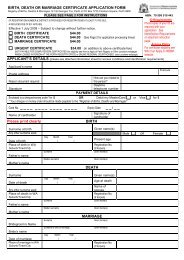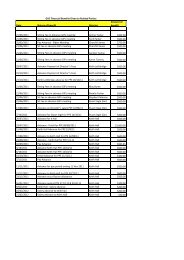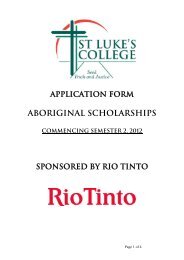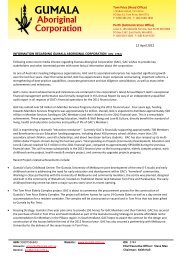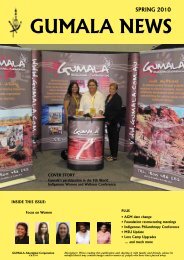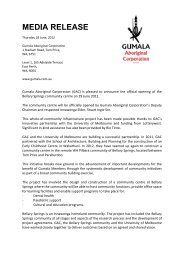Gumala News - Autumn 2010 Members Edition
Gumala News - Autumn 2010 Members Edition
Gumala News - Autumn 2010 Members Edition
You also want an ePaper? Increase the reach of your titles
YUMPU automatically turns print PDFs into web optimized ePapers that Google loves.
GUMALA NEWS AUTUMN <strong>2010</strong><br />
GUMALA NEWS AUTUMN <strong>2010</strong><br />
<strong>Gumala</strong> gives funding assistance<br />
to award-winning film<br />
Film writer-director Denise Groves<br />
is in awe of her amazing and loving<br />
grandmother, founding GAC<br />
Member Amy Dhu.<br />
So much so that Denise, who is also<br />
a GAC Member, decided to make a<br />
film about the 84-year-old Nyiyapali<br />
Elder. That film, ‘My Nan & The<br />
Yandi’, has gone on to be crowned<br />
“Best Documentary” at the WA<br />
Screen Awards.<br />
<strong>Gumala</strong> flew the Perth-based film<br />
maker up to Port Hedland for the<br />
launch of the short “doco” film, and<br />
funded the cost of making 50 DVD<br />
copies to distribute throughout the<br />
community including Pilbara schools,<br />
Pilbara libraries, and to some of the<br />
Elders.<br />
The film will soon be available for<br />
viewing on <strong>Gumala</strong>’s website. iiNet is<br />
providing the film to their members<br />
on the Freezone network until late<br />
May.<br />
Best Documentary award-winner<br />
Denise Groves at the 23rd WA Screen<br />
Awards. Photographer: Marie Nirme<br />
GAC Elder Amy Dhu during the filming of ‘My Nan & the<br />
Yandi’<br />
Denise’s reputation as an emerging<br />
film-maker has not gone unnoticed.<br />
SBS has shot a special profile piece<br />
on Denise and her film that will<br />
appear on the SBS TV program<br />
Living Black some time in May.<br />
Denise told <strong>Gumala</strong> <strong>News</strong> that the<br />
producer of ‘My Nan & the Yandi’,<br />
Jag Films, had sufficient funding to<br />
produce a short film, but she also<br />
made sure extra footage was taken<br />
so that a longer film may appear at a<br />
later date.<br />
“My Nan and her sister Doris are<br />
currently the two oldest Nyiyapali<br />
people. I am very proud of my Nan<br />
and I wanted to tell her story,”<br />
Denise said.<br />
“I’d like to encourage more<br />
Indigenous Australians from the<br />
Pilbara to tell their stories through<br />
the medium of film.<br />
“When I was growing up in Marble<br />
Bar, all the parents worked and<br />
my Nan looked after all the<br />
grandchildren.<br />
“She taught me how to read and<br />
write, and she told me many stories.<br />
“I particularly want people to know<br />
of and be proud of the Pilbara strike<br />
that the film talks of, which was the<br />
first Aboriginal strike ever.”<br />
Amy was born in Redmont, grew<br />
up in the region and became an<br />
inaugural Member of GAC when it<br />
was first established. She now lives in<br />
Port Hedland.<br />
Denise moved to Perth when she was<br />
15 and is the current Program Chair<br />
of Australian Indigenous Studies at<br />
Murdoch University.<br />
“I’m very proud of my<br />
granddaughter,” Amy told <strong>Gumala</strong><br />
<strong>News</strong>. “I spent many years looking<br />
after her during her childhood.<br />
“I used to take her bush all the time.<br />
Of course there was a lot more bush<br />
tucker back then, and there was a lot<br />
more rain... not like now.”<br />
This is Denise’s second short film<br />
working with Jennifer Gherardi of<br />
Jag Films. In 2003 Denise directed<br />
‘Amy goes to Wadjemup’, a short<br />
drama about a young indigenous girl<br />
who visits Rottnest Island and learns<br />
about its history, and encounters<br />
some magic along the way.<br />
About ‘My Nan and the Yandi’<br />
My Nan and the Yandi” tells the<br />
story of a granddaughter’s love for<br />
her grandmother and the important<br />
role a humble piece of tin played in<br />
her family’s story.<br />
In the film, Nan explains how the<br />
Yandi (a tin dish based on the design<br />
of a coolamon) was used to separate<br />
minerals from sand - using no water.<br />
While she grew up with the Yandi,<br />
Nan explains the importance of it<br />
during the Pilbara strike, which was<br />
the first aboriginal strike in Australia<br />
and which lasted for ten years.<br />
Her resilient character shines through<br />
as she speaks with pride and joy<br />
about how many aboriginal people<br />
made the most of such limited<br />
resources.<br />
What the Director says:<br />
“I wanted to make My Nan and<br />
the Yandi to show the love and<br />
admiration that I have for my<br />
Grandmother. At 84 she is a wellrespected<br />
Nyiyapali Elder who is<br />
loved by many. Having lived around<br />
Nyamal Country (Marble Bar) for<br />
over 60 years, Nan has many stories<br />
to tell. These stories are told with a<br />
wicked sense of humour, and include<br />
her early years of living in the bush,<br />
raising children, being a skilled<br />
hunter and being able to ‘yandi’. It is<br />
her skill of ‘yandying’ that is central<br />
to the telling of her story.<br />
“The yandi featured prominently in<br />
my childhood. Whenever my Nan<br />
took my cousins and I out bush, the<br />
yandi was neatly packed in the back<br />
of her 4 wheel drive, along with her<br />
22 rifle, fishing lines, and tucker<br />
box. As children we had became<br />
so accustomed to the yandi that we<br />
never really questioned it.<br />
“It was only when I became older<br />
that I realised the ingeniousness<br />
of the yandi and it’s cultural and<br />
political significance in my family’s<br />
story. A yandi is made from a<br />
piece of tin that has two curved<br />
sides. Its design was adapted from<br />
Writer-Director (and <strong>Gumala</strong> Member) Denise Groves on the film set<br />
a traditional women’s utensil called<br />
a coolamon. The simplicity of the<br />
yandi has always fascinated me, and<br />
I wanted to show how this humble<br />
piece of tin played an important role<br />
for Indigenous families in the Pilbara<br />
during the 1940s and 50s. In 1946<br />
hundreds of Indigenous peoples<br />
walked off the cattle stations striking<br />
for wages as opposed to being paid<br />
rations. I wanted to pay tribute to<br />
the role of Indigenous women during<br />
this period and in particular, to the<br />
yandi.<br />
“It was during this time the yandi<br />
came to the fore, and enabled<br />
hundreds of Indigenous families to<br />
survive. Given the strike occurred<br />
after the second world war and<br />
<strong>Gumala</strong> is encouraging <strong>Members</strong><br />
(or their children) aged between<br />
13 and 25 to enrol in a free filmmaking<br />
workshop, which will be<br />
held in Tom Price from June 11<br />
- 14.<br />
The four-day workshop will teach<br />
participants a range of basic<br />
film-making skills, including the<br />
use of digital video cameras. The<br />
workshop will include the making<br />
during the depression, I wanted to<br />
show how even though times were<br />
hard Aboriginal women liked my<br />
Nan were resourceful. Some of this<br />
resourcefulness is revealed in the<br />
film. I wanted the feel of the film to<br />
be a love story. It was to show the<br />
love between a Grandmother and a<br />
Granddaughter.”<br />
“Filming was to be intimate, a small<br />
crew, and close ups. I’ve changed<br />
from the film because I have<br />
recorded my Nan’s story, for her<br />
and for my family. Her story is now<br />
our story. Furthermore, I have also<br />
ensured that the ‘yandi’ can now be<br />
recorded as playing an important<br />
role in not only Indigenous but<br />
Australian history - and this, I am<br />
proud of.”<br />
Free film-making course in<br />
Tom Price this June<br />
of a film, which will centre on the<br />
theme of drug and alcohol abuse.<br />
Anyone interested in booking<br />
a place in the workshop should<br />
contact GAC’s Acting Project<br />
Specialist Rebecca Harkin :<br />
Phone 1800 486 252 or email<br />
rebecca.harkin@gumala.com.<br />
au. For more information, visit:<br />
www.changemedia.net.au/home/<br />
profile/manifesto/<br />
Page 14 <strong>Gumala</strong> Aboriginal Corporation <strong>Gumala</strong> Aboriginal Corporation Page 15







